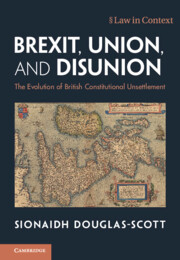Refine search
Actions for selected content:
81 results
IN DEFENCE OF CLASSICAL ADMINISTRATIVE LAW
-
- Journal:
- The Cambridge Law Journal , First View
- Published online by Cambridge University Press:
- 16 December 2025, pp. 1-34
-
- Article
-
- You have access
- Open access
- HTML
- Export citation
Chapter 18 - Devolution, Nationalism, and the Rhetoric of Independence
- from Part V - The People Now
-
-
- Book:
- 'The People' and British Literature
- Published online:
- 11 December 2025
- Print publication:
- 11 December 2025, pp 293-305
-
- Chapter
- Export citation
THE SCOTTISH FISCAL FRAMEWORK: PAST, PRESENT, AND FUTURE
-
- Journal:
- National Institute Economic Review ,
- Published online by Cambridge University Press:
- 11 December 2025, pp. 1-6
-
- Article
-
- You have access
- Open access
- HTML
- Export citation
1 - Laws for a Nation
-
- Book:
- Laws for a Nation and Laws for Transnational Commerce
- Published online:
- 31 October 2025
- Print publication:
- 20 November 2025, pp 1-70
-
- Chapter
- Export citation

Laws for a Nation and Laws for Transnational Commerce
-
- Published online:
- 31 October 2025
- Print publication:
- 20 November 2025
5 - The Aspirations of James Stuart
-
-
- Book:
- Law and Constitutional Change
- Published online:
- 26 September 2025
- Print publication:
- 16 October 2025, pp 80-97
-
- Chapter
-
- You have access
- Open access
- HTML
- Export citation
Cross-jurisdictional youth employment policy and welfare in Scotland, Wales and England: a street-level perspective
-
- Journal:
- Journal of Social Policy , First View
- Published online by Cambridge University Press:
- 13 June 2025, pp. 1-20
-
- Article
-
- You have access
- Open access
- HTML
- Export citation
Northern Ireland Childcare Strategy: A Work in Progress?
-
- Journal:
- Social Policy and Society , First View
- Published online by Cambridge University Press:
- 16 January 2025, pp. 1-14
-
- Article
- Export citation
Devolution and Social Citizenship: The Case of the Basic Income Pilot for Care Leavers in Wales
-
- Journal:
- Social Policy and Society , First View
- Published online by Cambridge University Press:
- 26 September 2024, pp. 1-14
-
- Article
-
- You have access
- Open access
- HTML
- Export citation
8 - Parting the Unions
-
-
- Book:
- The Conservative Effect, 2010–2024
- Published online:
- 24 July 2024
- Print publication:
- 27 June 2024, pp 236-283
-
- Chapter
- Export citation
Law and scale: lessons from Northern Ireland and Brexit
-
- Journal:
- Legal Studies / Volume 44 / Issue 2 / June 2024
- Published online by Cambridge University Press:
- 01 April 2024, pp. 201-220
- Print publication:
- June 2024
-
- Article
-
- You have access
- Open access
- HTML
- Export citation
Chapter 12 - Regions and Nations
- from Part IV - Theatre and State
-
-
- Book:
- The Cambridge Companion to British Theatre since 1945
- Published online:
- 14 March 2024
- Print publication:
- 21 March 2024, pp 246-263
-
- Chapter
- Export citation
Contesting the property paradigm amid ‘radical’ constitutional change: Living Rent and the Private Housing (Tenancies) (Scotland) Act 2016
-
- Journal:
- Legal Studies / Volume 44 / Issue 3 / September 2024
- Published online by Cambridge University Press:
- 11 March 2024, pp. 399-416
- Print publication:
- September 2024
-
- Article
-
- You have access
- Open access
- HTML
- Export citation
3 - Expanding the Migration Policy Playing Field
-
- Book:
- Immigration, Security, and the Liberal State
- Published online:
- 09 February 2024
- Print publication:
- 18 January 2024, pp 94-187
-
- Chapter
- Export citation
8 - Federalism, Devolution, and Differentiation
- from Part II - Five Themes
-
- Book:
- Brexit, Union, and Disunion
- Published online:
- 26 October 2023
- Print publication:
- 09 November 2023, pp 382-425
-
- Chapter
- Export citation
7 - Unions and Disunions
- from Part II - Five Themes
-
- Book:
- Brexit, Union, and Disunion
- Published online:
- 26 October 2023
- Print publication:
- 09 November 2023, pp 334-381
-
- Chapter
- Export citation
1 - Scotland
- from Part I - Five Case Studies of Acts of Union and Disunion
-
- Book:
- Brexit, Union, and Disunion
- Published online:
- 26 October 2023
- Print publication:
- 09 November 2023, pp 23-77
-
- Chapter
- Export citation

Brexit, Union, and Disunion
- The Evolution of British Constitutional Unsettlement
-
- Published online:
- 26 October 2023
- Print publication:
- 09 November 2023
THE UK INTERNAL MARKET: A GLOBAL OUTLIER?
-
- Journal:
- The Cambridge Law Journal / Volume 82 / Issue 3 / November 2023
- Published online by Cambridge University Press:
- 15 September 2023, pp. 530-562
- Print publication:
- November 2023
-
- Article
-
- You have access
- Open access
- HTML
- Export citation
15 - The Twenty-First-Century Constitution
-
-
- Book:
- The Cambridge Constitutional History of the United Kingdom
- Published online:
- 12 August 2023
- Print publication:
- 17 August 2023, pp 370-397
-
- Chapter
- Export citation
